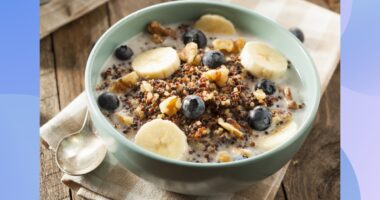
Mind over matter: can meditation soothe my troubled insides?
Meditating Buddhist monks have been shown to have healthier gut microbiomes and more effective metabolisms than non-meditators. Could an app make mine happier?
I am two weeks into my journey of improving holistic health via the means of meditation when my neighbour texts me to say she spotted me through my window, and am I OK because I “looked a bit dead”. These are not the glowing Gwyneth Paltrow vibes I was aiming for. But I had headphones in, I tell her. People can die with headphones in, she says.
At least it meant I had remained still for a length of time. After the latest remarkable study connecting meditation to improved gut health – itself a marker for overall positive health outcomes – I am attempting enlightenment of both the mind and bowels.
The most recent research, carried out by the Shanghai Mental Health Centre and published by the British Medical Association, saw researchers collect stool and blood samples from Tibetan monks who practised an ancient form of meditation – and had done for between three and 30 years – and found that compared with non-meditators their “intestinal microbiota composition” was linked to more effective metabolism, immunity function and decreased risk of anxiety and depression. In 2022, a Massachusetts study showed that subjects with a diagnosis of IBS (irritable bowel syndrome) or IBD (inflammatory bowel disease) who enrolled on a course of meditation and yoga also reported a decrease of symptoms.
The human gut contains trillions of interacting microorganisms: bacteria, fungi, archaea cells (similar to bacteria) – and bad stuff such as viruses. The ideal is to have a balanced and healthy microbiome to keep things ticking over nicely. Its makeup is a combination of heritable and environmental, ie there’s a genetic foundation, but the environment also plays a role in shaping the microbiome.
The gut, it is said, is the second brain. Or, more accurately, the enteric nervous system that regulates the gut is the second brain. It’s not news that the gut-brain axis is a thing: the phrase “my stomach dropped” when shocked or anxious exists for a reason; people vomit when nervous. But an increasing focus on our digestive systems by scientists, doctors, big pharma and wellness influencers suggests the gut has gone mainstream.
Lucie Hayter established The Gut Feeling, a team of psychologists, neuroscientists and dieticians, to help others reach optimum equilibrium via their gut health. She tells me that “our brains and guts talk to each other daylong. When our gut flares up it sends signals back to the brain; and when our brain is stressed and anxious it sends signals back to the gut. This leads to development or worsening of bloating, constipation, diarrhoea or stomach pain.”
I have a particular interest in this subject as, a few years ago, in scenes I can only describe as gutting, mine started playing up. A bout of seemingly innocuous sickness led to long-term symptoms. Cue months of investigative tests for infections with fun names like Helicobacter pylori; ultrasounds; an MRI scan; a CT scan; a colonoscopy (2/10, wouldn’t recommend); stool tests (scooping a bit of my own shit into a small pot then storing it overnight in my fridge, also would not recommend); breath tests.
I learned about probiotics, then prebiotics. I bought expensive liquids and supplements from mail-order companies. I blended so many powders and concocted so many potions I was basically Walter White. Then it turned out that, thanks to damaged nerves and muscles, I had developed something called SIBO (small intestinal bacterial overgrowth); the “bad bacteria” were running wild – my microbiome was not in a good place. For me, the cure only came with waiting for my gut to heal.
Alexa Duff is a psychologist with a focus on the gut-brain axis. She tells me that “gut health is so much broader than what you eat: it’s sleep, work-life balance, exercise, being in nature, and time with loved ones. These are the most important first steps.” Duff suggests I start with a simple-to-use meditation app, the market for which is huge. (The Gut Feeling has developed an app that offers a specific programme, but there is currently a waiting list.) I check out one of the most popular, Headspace, but knowing that I will forget to cancel the £50 annual fee should I decide not to continue after a free trial, and finding its user interface overwhelming, I plump for something simpler. I decide on The Mindfulness App because it says it is suitable for anyone over four.
READ RELATED: Eczema Can Hurt Your Mental Health—Here’s How to Find Support

The app asks me what I want to improve. Options I’d expect are there: reduce stress, improve focus; but there is also “increase compassion”, which is intriguing. I allow the app to send me notifications at a set time every day to remind me to complete a four-minute session. I choose noon. I put my phone in airplane mode, so as not to be disturbed with WhatsApp messages or screen grabs of other WhatsApp messages.
I am instructed to sit in a “posture that embodies dignity”. I try not to think of the day before when I was scrabbling around the floor of a cafe to reach a socket to charge my laptop. On the one hand, the breathing exercises highlight that, thanks to a deviated septum, one nostril is essentially blocked, but there is no doubt that focusing on the rise and fall of my chest makes me feel more chilled.
I decide that I will measure the effect on my gut health according to how cumbersome I feel. I remember, slightly panicked, how when I was ill I looked and felt as though I had a basketball under my shirt; that I was producing poos that resembled Maltesers (apologies); that I felt sluggish 24/7. After a week of using The Mindfulness App, I do as Hayter and Duff suggest and “check in”.
I am smashing it, according to the Bristol stool chart, which is like a hierarchy of poo shape, texture and colour. I remember Duff saying how important getting out in nature is – the benefits of green and blue spaces are multiple and evidence-based – so I go for walks. I pet dogs. I try to “prioritise sleep”, which I have been attempting to do regardless, having chosen decaf for some time now (although caffeine is actually thought to have a positive effect on the gut, not least because it stimulates its movement).
At this point I have developed something of a rapport with the app’s narrator, although it lessens when she describes my breath as my “friend”. Occasionally, she gets dry-mouth. My gut continues to behave itself, even when I eat a whole packet of KitKats for supper, thinking I have probably undermined the entire project. Instead, the next day the app tells me that I am doing excellently, and I think of that Kris Jenner meme: “You’re doing amazing, sweetie!” Now comes an option to share my progress on various social media platforms, which I decline.
Soon enough, the app restricts my access to further exercises until I pay for its premium tier. Stymied, I click on a 10-question stress test. “How often have you been upset because of something that happened unexpectedly?” the app asks after thwarting my progress in the name of profit. I choose “very often”, and shake my head. I continue to do the exercises I do have access to. I reread the 2015 surprise bestseller by the German author Giulia Enders, Gut: The Inside Story of Our Body’s Most Underrated Organ.
In the final week of my experiment, I swallow my tooth or, technically, half a veneer. I don’t know how this will affect the Bristol stool chart. I think about the bacteria in my gut assessing this porcelain interloper. I imagine the veneer washed in acid, bobbing like flotsam in the sea. I head to an emergency dentist and pay such an egregious sum of money for a temporary fix that it threatens to undo every bit of meditative improvement I’ve made. Then I go home and watch ASMR (autonomous sensory meridian response) videos on YouTube, in which relaxing sounds associated with, say, haircuts or painting are played. The rhythmic snip of scissors; the soothing swish of a paint brush across a canvas.
In truth, it’s these videos and the walks in the park, the cold-water swimming (with apologies for being a cliche) that I feel make the most difference to how I feel “within myself”. They are my preferred meditative options. Alexa Duff tells me a lot of people also benefit from “Nerva gut-directed hypnotherapy” and, for chronic conditions such as Crohn’s and ulcerative colitis (in which parts of the digestive system are inflamed), she works long-term with people in a therapeutic setting.
There are plenty of physical and dietary interventions proven to help gut problems, from tailored low-FODMAP diets (which cut out certain foods, mostly high in fructose, lactose and monosaccharides) to intense procedures like faecal transplants, but it makes perfect sense to me that mind and body are in sync. After a month of meditating each day, I can’t say that I have noticed a vast improvement in gut health, but I also haven’t had periods where I feel particularly squiffy or leaden – and that has a big positive effect on my mood. If, as Hyter puts it, our guts and brains are constantly talking to each other, it has certainly been a worthwhile conversation.
Source: Health & wellbeing | The Guardian









